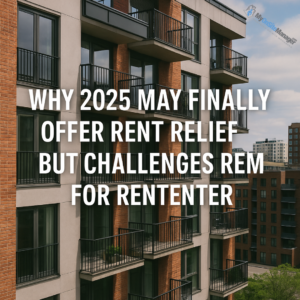After years of relentless rent hikes, there is cautious optimism that 2025 might mark a turning point for renters. From 2021 to 2023, rental costs skyrocketed by nearly 26%, with median asking rents climbing from $1,350 to $1,700 nationwide. For many households, this sharp increase pushed housing costs far beyond the recommended 30% income threshold, leaving tenants struggling to keep up.
But now, experts say we may see a slight reprieve—thanks largely to the recent boom in apartment construction and a cooling economy. In cities such as Atlanta, over 15,000 new apartment units were completed in 2024, which has already begun to stabilize local rents and, in some cases, caused them to drop.
Why Are Rents Stabilizing?
Several factors are converging to give renters a breather:
-
Increased Housing Supply
For the first time in years, developers have delivered a large number of new apartments to the market. This additional inventory helps reduce competition for existing units, easing upward pressure on prices. -
Economic Slowdown
With job growth cooling and inflation stabilizing, the demand for expensive new leases is waning slightly. Some renters are opting to stay put rather than compete in a still-pricey market, leading to softer demand. -
Rising Mortgage Rates
Mortgage rates are hovering between 6.6% and 7%, keeping many would-be homebuyers in the rental market. While this sustained demand can limit how far rents drop, the market is still adjusting to the balance between high rates and increased supply.
Expert Insights: A Mixed Picture
-
Stephen Clyde, a market analyst, is optimistic, predicting that new construction will finally give tenants some leverage to negotiate better rental terms.
-
Ari Harkov, however, warns that economic uncertainty could work against renters. If job stability declines, landlords may keep rents high to offset risks or reduced occupancy.
-
Molly Boesel adds that persistent high interest rates mean many renters have no choice but to stay in place, creating continued pressure in high-demand areas despite new supply.
The Construction Cost Barrier
While new apartments are hitting the market, the pace of future development is still constrained by high construction costs. Developers face rising expenses for:
-
Labor and materials (steel, lumber, appliances)
-
Insurance premiums
-
Local government permits and zoning fees
In addition, tariffs on imported materials continue to keep costs elevated, which often trickles down into the rental prices of newly built properties.
Tips for Renters in 2025
If you’re planning to move this year, here are strategies to help you secure the best deal:
-
Start Your Search Early
Begin looking at least 60 days before your lease ends, especially if you live in a competitive metro area. -
Negotiate During Slow Seasons
Consider moving during the off-season (winter months) when landlords are more willing to offer concessions like reduced rent or free parking. -
Look Beyond Hotspots
Expanding your search by just a few zip codes can lead to significant savings—emerging neighborhoods often have better rates and incentives. -
Consider Longer Lease Terms
If you find a favorable rent, lock it in for 18–24 months to hedge against potential price increases. -
Use Market Data to Your Advantage
Research local vacancy rates and rental trends. If the market is saturated with available units, you’ll have more bargaining power.
What This Means for the Long-Term Market
While 2025 could bring a short-term reprieve, experts caution that the long-term rental outlook remains uncertain. Factors like tariffs, construction slowdowns, and ongoing demand from millennials and Gen Z will continue to shape the housing market. Without major policy changes or incentives for affordable housing construction, the rent crisis could resurface in the coming years.
Final Thoughts
For renters, 2025 is shaping up to be a year of cautious optimism. While the rent may not be “too damn high” compared to recent years, affordability challenges remain. The key will be to stay proactive, informed, and flexible when navigating the rental market.
Source: Salon: The rent might not be too damn high this year (May 25, 2025)

